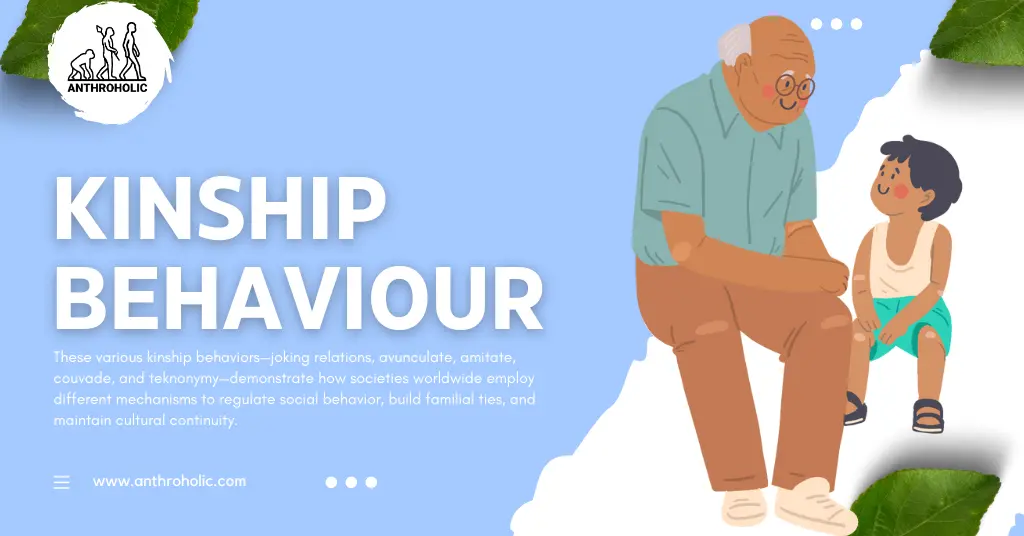AI Answer Evaluation Platform Live Now. Try Free Answer Evaluation Now
Kinship Behaviours
In the grand tapestry of human cultures, kinship structures and behaviours offer unique threads that unite us all. Kinship plays a significant role in shaping social norms, responsibilities, and interactions among community members. Understanding these behaviours is fundamental to anthropology, enabling us to decipher the complex dynamics of human societies.

Joking Relations
Joking relationships, or relations de plaisanterie, are social agreements where certain forms of teasing, mocking, or practical joking are not only permitted but also expected among certain pairs of kin [1].
Common Traits of Joking Relations
- Open mockery or teasing without negative repercussions
- Specific familial or societal ties
- Balancing of tension and conflict within society
Table 1: Examples of Joking Relations in Different Cultures
| Culture | Kinship Relation |
|---|---|
| Many African societies | Between paternal uncles and nephews |
| Inuit societies | In-laws |
Avunculate
Avunculate refers to the special relationship between a man and his maternal nephew. This relationship often entails specific responsibilities and is considered significant in many cultures [2].
Key Features of Avunculate
- Special rights, duties, or expected behaviors between a man and his sister’s son
- Can involve inheritance, guardianship, or special rituals
Table 2: Avunculate Relations in Different Cultures
| Culture | Type of Avunculate Relation |
|---|---|
| Southwest Native American tribes | Uncle-nephew ties pivotal in tribal leadership succession |
| Roman societies | Influence on nephew’s political career |
Amitate
Amitate, or co-mothering, involves two or more women sharing mothering roles, often in societies where kinship ties are crucial. It involves shared responsibilities and social privileges [3].
Central Aspects of Amitate
- Shared childcare responsibilities and roles
- Increased social and emotional support for the children
- Enhanced cooperation and collective identity among women
Couvade
Couvade is a custom where a father-to-be imitates the physical symptoms of pregnancy and childbirth, often performing symbolic rituals. It is thought to represent empathy and shared parental responsibility [4].
Characteristics of Couvade
- Sympathetic pregnancy symptoms in men
- Ritualistic behaviors representing childbirth
- Enhanced father-child bond
Table 3: Examples of Couvade Customs
| Culture | Couvade Custom |
|---|---|
| Trobriand Islanders | Men simulate labor pain |
| Certain Basque communities | Men rest post childbirth |
Teknonymy
Teknonymy is a naming system where parents are referred to by their children’s names. This system reinforces societal values, such as respect for elders and familial connections [5].
Fundamental Aspects of Teknonymy
- Parental identities linked with offspring
- Emphasis on familial lineage and connections
- Reinforced social hierarchy
Table 4: Teknonymy Examples
| Culture | Teknonymy Practice |
|---|---|
| Bali, Indonesia | Parents referred to as ‘father/mother of [first child’s name]’ |
| Traditional Arab societies | Father often called ‘Abu [son’s name]’ |
Conclusion
These various kinship behaviours—joking relations, avunculate, amitate, couvade, and teknonymy—demonstrate how societies worldwide employ different mechanisms to regulate social behavior, build familial ties, and maintain cultural continuity. The diversity of these practices underscores the complexities of human societies, reinforcing the importance of anthropological studies in understanding the myriad threads that weave our collective human story.
References
[1] Radcliffe-Brown, A. R. (1940). On Joking Relationships. Africa: Journal of the International African Institute, 13(3), 195-210.
[2] Schneider, D. M. (1961). The distinctive features of matrilineal descent groups. In D. M. Schneider & K. Gough (Eds.), Matrilineal Kinship. University of California Press.
[3] Gow, P. (1991). Of Mixed Blood: Kinship and History in Peruvian Amazonia. Clarendon Press.
[4] Pitt-Rivers, J. (1977). The Fate of Shechem or The Politics of Sex: Essays in the Anthropology of the Mediterranean. Cambridge University Press.
[5] Al-Zwaini, L. (2002). The Mareer and their Teknonymy: Tracing the Arabian influence. In K. Steiner & L. Al-Zwaini (Eds.), Genres and Techniques of Traditional Yemeni Poetry. Brill.




